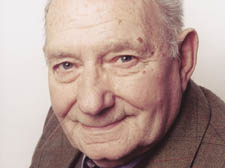|
|
 |
| |

Bill Budd |
Churchill’s bodyguard who became mayor three times
BILL Budd, who has died aged 86, will be best remembered in Camden for his three spells as mayor, his tireless work campaigning for pensioners’ rights and in support of council tenants, and as a fearless believer in equality.
He grew up in a large family, one of 13 siblings, including stepbrothers and sisters. His father was a builder. His mother died when Bill was a boy.
He was a keen sportsman and showed talent as a footballer, but his prospects as a professional were curtailed by the war.
In 1939, as a 17-year-old, he joined the British Army as an infantryman. His war record was impressive, as the array of service medals he would wear on Remembrance Day illustrated. He was a Desert Rat, and fought with the Eighth Army in Africa.
His talents as a soldier were recognised and he was chosen to be bodyguard to Winston Churchill, following the Prime Minister everywhere. His daughter Linda recalls being shown a memento from her father’s time with Churchill – the end of one of the Prime Minster’s cigars he had swiped as a keepsake. A photograph of Bill with Churchill now graces the entrance of the Cabinet War Rooms in Whitehall.
Bill then returned to active front-line service, and was in one of the troop ships that landed on the Normandy beaches in 1944.
After the war, he became a professional footballer with Queens Park Rangers, a club he supported for the rest of his life. He and his wife Iris had season tickets at Loftus Road for many years.
He also had an ear for music, and as a young self-taught pianist would entertain in pubs. While mayor, no function would be complete without him leading a sing-song. When he returned to Normandy to mark the 60th anniversary of D-Day with other veterans, he found a French bar and led a four-hour singing session with other soldiers, belting out the songs that kept Britain going during the war years.
But it was in politics that Bill made his mark. After quitting football – he concentrated on running amateur football teams on Saturdays and Sundays in west London instead – he joined the Post Office as a telephone engineer and quickly became involved in the Post Office Engineering Union, now the Communication Workers Union.
He was far-sighted, showing green credentials back in the early 1970s. When the Royal Free Hospital was being built in Hampstead, he suggested a radical plan to save energy by combining the heat and power systems in the new building. He also made similar suggestions to Camden’s housing teams.
A tenants’ leader in Kilburn and West Hampstead, he became a Labour councillor in 1971. He chaired Camden Action Committee Against the Housing Act, which fought Tory government plans to force councils to put up rents.
Camden Council, under threat of councillors being surcharged and dismissed, was pressured by central government to enforce the act. But Bill would not back down, and eventually the issue was resolved when Labour returned to power in the 1974 autumn election and overturned the legislation.
His principles led him to take a stand on many contentious issues. When Chalk Farm library was threatened with closure, Bill went against the Labour group by voting to keep it open – a decision clinched by one vote. Following the vote, he handed in his resignation, which was rejected immediately by fellow councillors, who recognised Bill was voting with his conscience, even if it was not what the ruling group wanted.
Before he retired in 2002, he joined councillor Dermot Greene as a Labour whip. The pair were known for balancing the needs of backbench members against the wishes of the leadership, and finding a happy medium that kept the group unified over difficult issues.
He gained a reputation for being scrupulously fair. At the Town Hall he worked closely with the building works and services department, which then employed thousands of staff running services which have since been privatised.
He was known as a deal broker and was trusted by the Town Hall’s workforce, as his experience as an engineer and shop steward helped him understand the needs of working people.
Bill’s organisational abilities were utilised by other clubs he joined. He was a Moth, a Member of the Tin Hats, a veterans’ group, and was a senior officer in the Royal British Legion, as well as finding the time to be president of the London Labour Mayors Society.
He is remembered by the many pensioners who benefited from his work on Camden Older People’s Group, Kilburn Pensioners Group and as a member of Age Concern.
Frank Dobson, the MP for Holborn and St Pancraa, who served on Camden Council with Bill, said: “He was a good friend. He was a very determined and reliable councillor, when he said he would do something, he would do it.”
He is survived by two daughters, a son and his wife, Iris.
The funeral takes place next Thursday, April 5, at Bedford Crematorium, Morse Road, Bedfordshire. Friends and comrades are welcome.
DAN CARRIER
|
 |
|
 |
|

